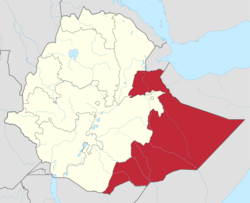Somali region
|
Somali Region Deegaanka Soomaalida ሶማሊ ክልል |
||
|---|---|---|
| kilil | ||
| Ethiopian Somali Regional State | ||
|
||
 Map of Ethiopia showing Somali Region |
||
| Country | Ethiopia | |
| Capital | Jijiga | |
| Government | ||
| • President | Abdi Mohamoud Omar | |
| • Vice-President | Mawlid Hayir | |
| Area | ||
| • Total | 279,252 km2 (107,820 sq mi) | |
| Population (2013) | ||
| • Total | 5,318,000 | |
| • Density | 19/km2 (49/sq mi) | |
| Demonym(s) | Somali | |
| Time zone | EAT (UTC+3) | |
| ISO 3166 code | ET-SO | |
The Ethiopian Somali Regional State (Somali: Dawlada Deegaanka Soomaalida Itoobiya, Arabic: الدولة الاثيوبية المنطقة الصومالية) is the easternmost of the nine ethnic divisions (kililoch) of Ethiopia. It is often called Soomaali Galbeed ("Western Somalia") on account of its geographical position within the Greater Somalia matrix. The state borders the Ethiopian regions of Oromia, Afar and Dire Dawa (Diridhawa) to the west, as well as Djibouti to the north, Somalia to the north, east and south, and Kenya to the south-west.
Jijiga has been the capital of the Somali Regional State since 1994. The capital had been Kebri Dahar (Qabridahare) until 1992, when it was moved to Gode. On April 1994, the capital was moved to Jijiga on account of political considerations. Other major towns and cities include: Degehabur, Kebri Beyah, Kebri Dahar, Godey, Shilavo, Geladin, Feer-feer, Kelafo, and Werder.
The Somali Region covers much of the traditional territory of Ogaden and it formed a large part of the pre-1995 province of Hararghe. The population is predominantly Somali, and there is internal pressure to remove Ethiopian rule. There have been attempts to incorporate the area into a Greater Somalia. In the 1970s, Somalia invaded Ethiopia in support of a local guerrilla movement, igniting the Ogaden War, which Somalia lost due to timely military intervention from the Soviet Union and its ally Cuba. Despite this defeat, local groups still seek either to become part of Somalia or independent, frequently resorting to violence; one such action, the 2007 Abole oil field raid, has led to a series of military reprisals against civilians accused of supporting the Ogaden National Liberation Front.
...
Wikipedia

